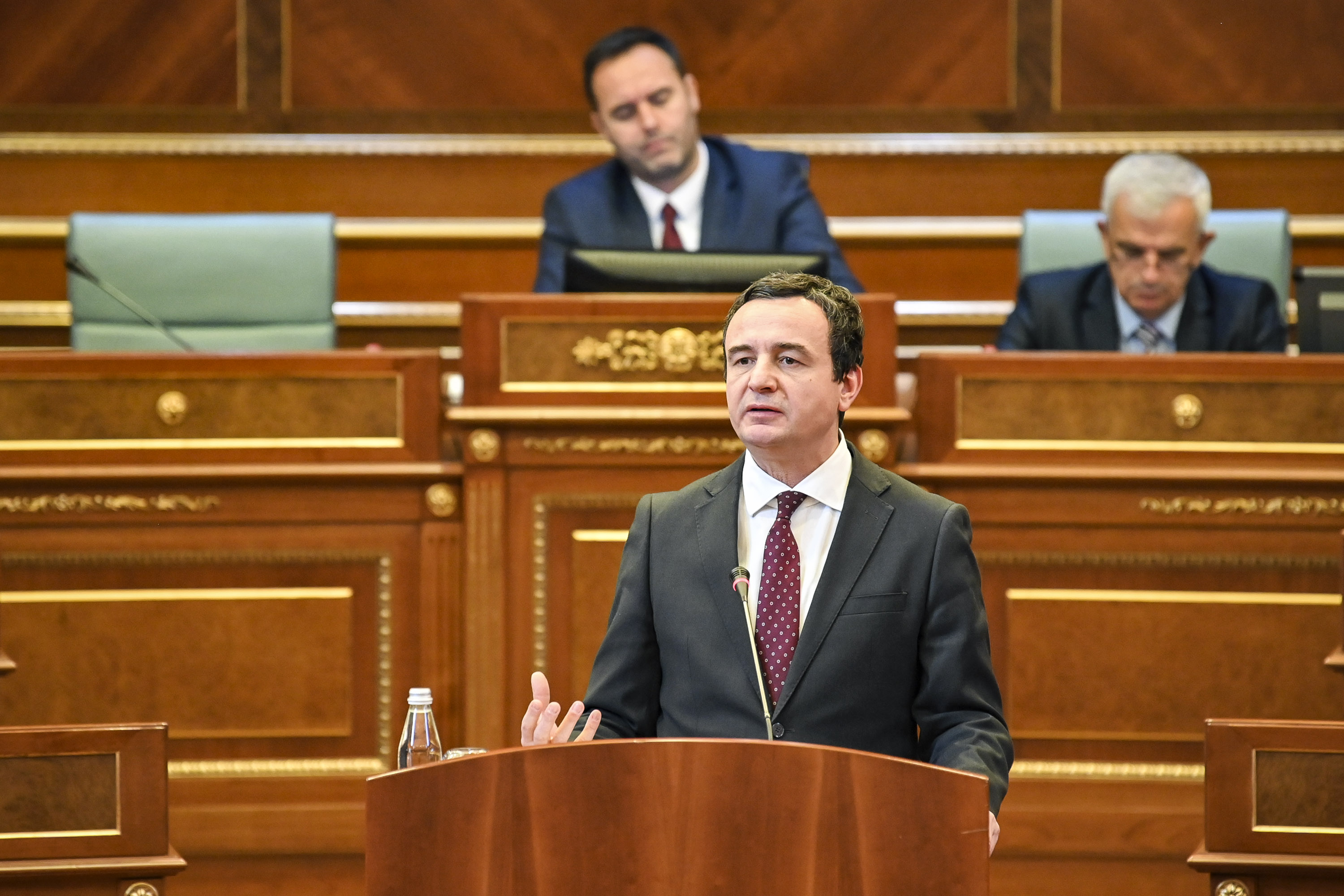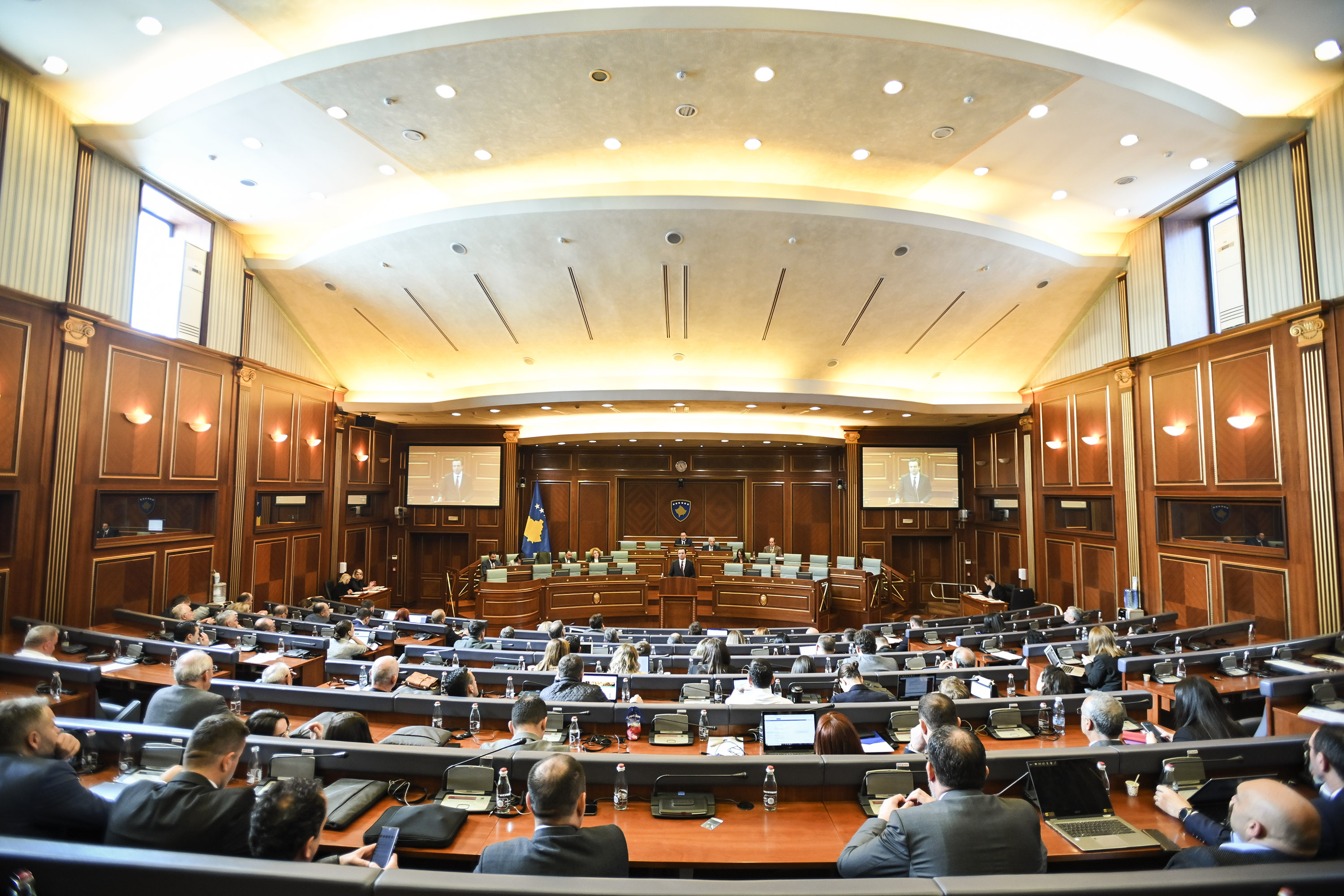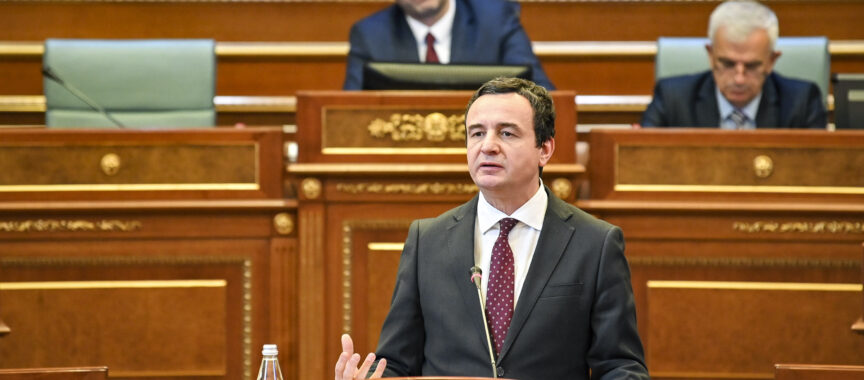Pristina, November 24, 2022
Thank you, Speaker Konjufca,
Dear Members of Parliament, Government Ministers,
Ladies and gentleman,
Our aim was that Franco-German proposal for normalization through a legally binding international agreement, to become a matter of negotiations in Brussels towards reaching an agreement, which attaches to our normal and democratic state a normal and European relationship with Serbia, our northern neighbor.
It was clear from the statement of Vice President of the European Commission and High Representative for Security and Foreign Policy, Borrell, that such a thing was not included in the discussions on Monday.
It now appears exactly and with a clear status in the first paragraph. But it was not on Monday`s text, which was offered to me at the end.
I believe that this is a great achievement, because for the first time the dialogue process entered a phase of negotiation on the General Framework, which will be legally binding and will solve fundamental problems from international law prism.
On August 18, Mr. Borrell made a valuable contribution, because he structured the dialogue with the first point, the General Framework Agreement, and I think that August 18 is the most important date in these two years in terms of the process of dialogue. First point, General Agreement Framework. Second point, current affairs. We cannot avoid the second point, even though current affairs sometimes seem technical, still they are related to peace and security.
However, the license plate issue is a technical, administrative issue. I completely agree, but on the other hand, I have to admit that in September of last year we also started not only to deal with technical issues, from the moment when Russian ambassador in Belgrade, Aleksandar Boçan-Kharchenko, came to Jarinje and Bërnjak, to inspect the gathering of Serbian troops and up in the air lifted a MIG29 aircraft. Now this is all about license plates. Even the license plates are technical, but the consequences are even more than political.
Therefore, I have agreed, that the second point in the dialogue should be, current affairs, English current issues, that’s what they call them. Meanwhile, the first was the General Agreement Framework. This is important. So let’s start from the General Agreement Framework.
On Monday evening I was offered a document as a joint agreement, which had 95 words and the words France and Germany were nowhere to be found. Also, it did not refer to Franco-German proposal or to European Union as we are now saying, except license plates issue to the issue of this proposal. So, the proposal is not stated, but it is said ‘the license plate issue will be resolved, according to that proposal’ without saying Franco-German. 95 words. Meanwhile, this one, which was agreed last night, has 194 words, more than twice the text. They are completely different.
Those who say that what was not accepted on Monday, was accepted on Wednesday, do not know what they are talking about. It’s twice as big as last night’s text and it’s not a deal. It’s a deal, but not an agreement. Do you know why it’s not an agreement? Look at what it says in the title: Statement by HR/VP Borrell regarding the EU facilitated dialogue, so it’s Borrell’s statement.
What was done last night, is that Borrell’s statement was changed. We have not changed our position, Borrell has changed his statement and that is very good.
Last night’s agreement is not a license plate one. We agreed to mutually cease actions, so we will not issue fines for KM license plates and we will give space to European Proposal negotiation, which was earlier called Franco-German and I am calling it European on purpose, since on November 11, when I met Mr. Borrell and Lajçak in Paris with my advisers’ team, when I was there, when I said the Franco-German proposal, he reacted harshly and said that it is a European proposal. I said, okay, and I apologized. From now on I will call it European, with the support of France and Germany.
However, I saw on Monday that it is Franco-German, that if it was European Union’s proposal, he would not abandon it so easily. Actually, on Monday it was proved to me that it is actually Franco-German, but since it is insisted to be called the European Union, I have no problem with that.
Currently, we want to create a basic measure of trust to give a chance for dialogue quickly, and it should start within a few days. In the penultimate paragraph, it is said that in the following days and it is very good that now everything has been accelerated.
I know that I had requests from Mr. Lajçak for 12 months, from Mr. Escobar for 10 months, but I believe that this can be done and is being done much faster. There is no need for 12 months and 10 months and our stay came out right. That vehicle registration center in Rashka no longer issues KM. There is no need for 12 months. Why 12 months? Why 12 months? And, of course, this is good for Kosovo, but not simply for the state of Kosovo. It is also good for mutual relations with our northern neighbor, since they also benefit.
We declared our independence from Serbia. Serbia will benefit when it declares independence from Kosovo. It’s not just us who benefit, but they also.
The other is that the license plate part of last night’s agreement means that Government does not issue and register new license plates. It is clear in the text and gradually illegal license plates will be phased out under such a mechanism.
We managed to implement the principle of reciprocity in that section of the agreement, which became Borrell’s declaration, but we emphasize, it is valid only towards the end of the Franco-German document negotiation. When this negotiation is completed, the term of this agreement also expires.
Yesterday’s agreement has a main and time target for the negotiation and compliance of parties regarding European Union proposal supported by France and Germany, and it is as soon as possible but not later than the beginning of the spring of 2023, which is stated in the penultimate paragraph. So before the beginning of the spring of 2023, it could be earlier but it doesn’t make it later. And the agreement that must be reached shall be legally and internationally binding. So we do not want a full normalization agreement that is only legally but also internationally binding, that is in the spirit and purpose of Vienna Convention on the Law of Treaties. This makes it internationally in addition to being legally binding.
Another important issue is that the agreement refers to European Union official position, implying that products of Brussels dialogue, that is, past agreements are implied as a general dimension which is an integral part of the Franco-German plan. Now we cannot deny such an implication of the European Union, but we also emphasize that everything related to them is and will be considered within European Union’s proposal, supported by France, Germany and United States of America. So we have accepted that Brussels agreements are part of the Franco-German plan scope in their entirety and their ambiguity together.
Our agreement is a recognition of EU position, not a stance towards something concrete. We have not accepted any reference to a concrete agreement to be included in last night’s text. During Monday talks, the biggest insistence was that the Association of Municipalities with Serbian majority should be included in the agreement made in Borrell’s statement. They see Association as the essence of normalization, while we see mutual recognition as the essence of normalization, and it’s a big difference between Monday and Wednesday. On Monday, Borrell and Lajçak were there, whereas yesterday, as you saw, only Lajçak was there.
Second, we disagree with the past, but the legacy of past governments has become the official position of the European Union itself. So the legacy of the agreements is European Union position, that’s why you have them in Borrell’s declaration. Its change takes time and must be done within the framework of a larger plan, the Franco-German one, which we will continue to call the proposal of the European Union.
Yesterday’s agreement establishes the first negotiating principle of the Franco-German, European negotiation process, the principle that we and Serbia are equal parties, which is why we are named as “parties”, that is, as parties. Such a framework is a strong advance towards the fact that the proposal will be an international agreement, legally binding and with mutual recognition at the core. So international and legally binding, as per Vienna Convention on the Law of Treaties.
For the first time, Serbia has accepted that the names of the cities of Kosovo are part of the territorial jurisdiction of our Republic. Such a step is fundamental in terms of closing illegal and parallel structures and ending their financing in the near future.
And finally, regarding some things that were mentioned, let me inform you about my attitude in each meeting, not only in Brussels. I have appealed to all Serbs who are in institutions, do not leave them, do not resign, do not go, but I have not told them to return. I have no right to tell them to go back. I have the political right to tell them not to go, but I don’t have the right to tell them to come back. Their departure is an individual political act, their return is a legal, constitutional, institutional issue.
I have not been to the beginning of the session before this and we saw that they returned. They returned and took the oath. Those who went did not return, others returned, took the oath because the Constitution and the law say so. So the return of Serbs to institutions cannot be done politically. It is a juridical-legal-constitutional issue. Of course, I don’t want to have one-ethnic institutions, but even though Serbs have gone, they are not one-ethnic. First, the majority of Serbs in institutions continue to be in institutions. Secondly, there are the Bosnians, Turks, Roma, Ashkali, Egyptians, Gorans, which are also minorities. It is not only the Serbs. Montenegrins too, said a deputy there.
So, all these minorities are, including Croats. These are minorities in our country, and our country does not have just one minority. It is true that it is the largest minority in number, but it is not the only one. So don’t go, yes. Go back, I can’t. I believe that this attitude should be maintained by all the representatives of our people and I, as the Prime Minister, and our Government obviously needs it and cannot succeed without the Assembly, without everyone’s support. We need your support, you need our notice, but we all need discussion together and I am willing to do that. Either in plenary session, either in a closed doors session, either in meetings with leaders, because I don’t want to walk alone. It is an issue beyond any of us, an issue beyond this governing mandate.
And as for the dialogue with local Serbs, I met 10 Kosovo Serbs who lead different organizations yesterday. You must understand one thing. They don’t want photos from the meeting. They don’t want photos from the meeting. Dialogue with local Serbs is taking place. But I can’t protect them yet. I am very sorry that six Serb cars were burned and I did not manage to protect them. I am very sorry about this.
Even Serbs when they come to meet me, they don’t want to be photographed. We discussed for an hour and a half, but they don’t want to take pictures, because they will get revenged on. And I believe that the most egregious case was that of my former advisor in Kurti 1, in the spring of 2020, who resigned two hours after being appointed.
So, we have to have the dialogue, but we have to understand that we cannot publish this dialogue as such. I believe that many of you also meet Kosovo Serbs. Ask if they are willing to publish it. I believe that in almost all cases they will say no. And meet them as much as possible. I encourage you to meet them as much as possible to integrate them. But we also have to protect them. Why should we? That we are not able to protect them. There are illegal structures that operate in the north of Kosovo and after the actions in the north of Kosovo they go to that hotel on the other side of the border where criminals have their headquarters. It’s in Serbia. They have their headquarters there. That is, on the other side of Kopaunik Mountain, there is a hotel where the headquarters of criminals gather who burn cars and then run away. We are failing to protect them. There is no rule of law anymore, but of course it is not like in other parts of the country. And this is what we should aim for. So, there is dialogue with local Serbs, but we have to do it very carefully.
Thank you.
Last modified: November 29, 2022


